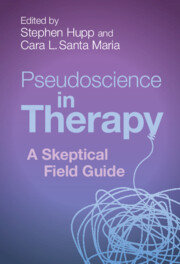‘‘Psychotherapy' offers a spectrum of practices and techniques, some effective and evidence-based, some of dubious value, and some that violate the principle of ‘do no harm'. This book is an impressive, comprehensive, and well-written guide to choosing efficacious therapy while avoiding the useless and the bogus. I highly recommend it.'
James E. Alcock - York University, Canada
‘This book is a valuable contribution to the literature on bogus psychotherapeutic techniques for a wide range of psychological disorders. It provides a comprehensive overview of what works and, more importantly, what doesn't. It will be useful to therapists to guide their choices of which techniques to employ.'
Terence Hines - Pace University, USA
‘Pseudoscience in Therapy is about bad ideas in the mental health field, and also about good ones. It's about the untested, unsupported, and potentially harmful treatments for various conditions, such as trauma, dissociative disorders, pain, and insomnia. And it's about the good, evidence-based practices for these conditions. A superb collection of clinicians and researchers share their wisdom about the pseudoscience they have seen, and the good practices they encourage. With this one-of-a-kind book, that so artfully encourages skeptical thinking, both patients and their treaters will be far better off.'
Elizabeth F. Loftus - University of California, Irvine, USA
‘Hupp and Santa Maria have produced a book that should be on every therapist's shelf. A complete, easy-to-use guide to all the many dubious psychological therapies and their evidence-based counterpoints. Experts in the major psychological disorders succinctly review the scientific and pseudoscientific landscape in a form that makes additional research easy to pursue. Highly recommended.'
Stuart Vyse - contributing editor Skeptical Inquirer magazine and author of Believing in Magic: The Psychology of Superstition
‘This client- and outcomes-focused book is a valuable read for both new and experienced therapists. Experts from multiple fields weigh in on potentially harmful practices commonly used for various diagnoses, as well as provide effective evidence-based treatments for the same diagnoses. The chapters in this interesting collection can help you think more critically about popular treatments and our responsibility as therapists to deliver the best care possible, supported by science.’
Judith Beck - President of the Beck Institute, USA
‘… [an] excellent text … Recommended.’
D. C. Marston
Source: Choice



